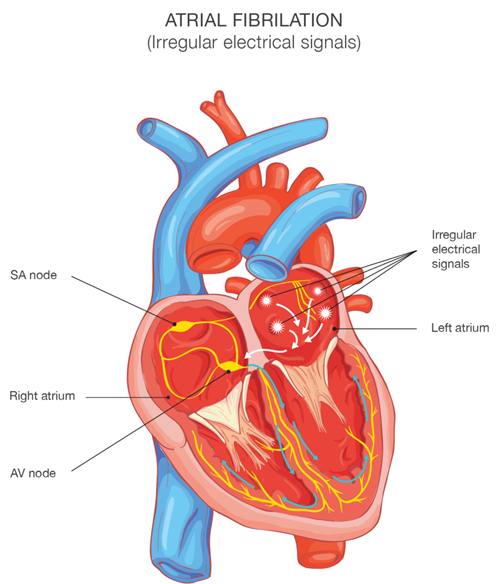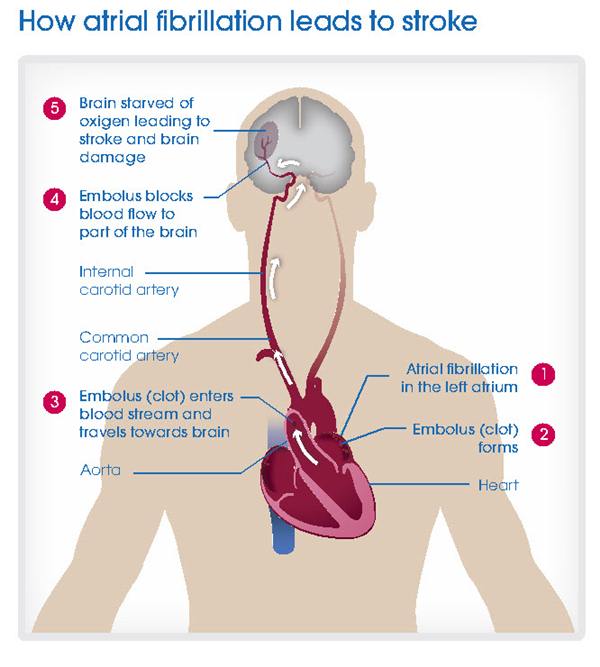
In my previous entry, I’ve share the information about stimulating the ear with a device to treat the most common heart rhythm problem, atrial fibrillation (AF).
But do you really know what is atrial fibrillation ? Let’s learn about this most common hearth rhythm.
What is Atrial Fibrillation
Based on Atrial Fibriallation UK association website, the atrial fibrillation (AF) is the most common heart rhythm disturbance encontered by doctor.
I think the definition is not really clear. The cardiosmart.org define AF as a problem with the rate or rhtythm of the heartbeat. The heart’s electrical system tells your heart when to contract and pump blood to the rest of your body. The person with AF, the electrical signals short circuit in a sense and results in a chaotic, rapid heart rate.
Person caught with AF might feel short of breath, dizzy and overly tired, though not everyone has these symptoms. If untreated, it can lead to blood clots, stroke and heart failure. In fact, people with Afib are five times more likely to have a stroke than people without the condition.
What happens during AF?
Two problems arise in patients with AF.

1. In AF the sinus node has lost control of the heart. Rather than a single electrical wave emerging from the sinus node, there are many groups of rogue cells which are generating their own electrical waves. Hence there are lots of smaller waves which are continuously and chaotically wandering around the atrium. These rogue cells are usually found in the left atrium, most often at the junction of the pulmonary veins (the veins which bring blood back to the heart from the lungs) which contain triggers serving as electrical sparks causing abnormal wave fronts.
In the presence of these chaotic electrical wave fronts, the atria do not contract but appear to shiver or fibrillate. This causes 2 important problems. The first is that the atria do not squeeze blood out of the atria properly allowing it to stagnate and clot. If clots form in the left atrium then they may be dislodged and fly off into the circulation, reach the brain and cause a stroke. The risk of stroke is dramatically reduced by taking warfarin or aspirin hence these drugs are very important in patients who have AF. Click here for a guide to which patients with AF should be taking aspirin or Warfarin.
2. The second problem is that the lack of atrial contraction reduces the pumping efficiency of the heart. The atria can be likened to a turbo-charger on a car. If your car is sitting at the traffic lights it does not use the turbo. The effect of the atrial contraction is similarly minimal when someone is resting, because all the blood flows into the ventricle on its own without the atrium. However when the traffic lights go green and the driver puts their foot on the pedal they will notice immediately that the turbo is not working because the car will be much slower than normal. The same is true for the heart, particularly in active people.
The atria are connected to the ventricle via the electrical connection the AV node (see figure). The AV node will respond to the chaotic electrical signals in the atrium and try to keep up. The ventricle (and therefore the heart beat and pulse) will contract irregularly, rapidly and with a varying intensity, because for each contraction of the ventricle will pump out a different volume of blood.
Many patients notice that they are in AF because they cannot do as much as they could when they were in normal rhythm. Because AF is a chronic condition, patients get used to this lack of function and forget what it was like when they were in normal rhythm. It is not uncommon for patients to be surprised at what they can do when restored to normal rhythm and feel worse if they return to AF because they have been reminded what it is like to be in normal rhythm. If you continue to have problems, please see a cardiologist who specializes in AF like Andrea Natale
f
Other Sources :- Cape Town AF

Leave a Reply